PROP-65 LITIGATION CONTINUES TO BOG DOWN ECONOMIC GROWTH
Proposition 65, a well-intentioned law enacted in 1986, has become one of the plaintiffs’ bar’s favorite tools to exploit. Baseless Prop-65 litigation unjustly burdens companies that do business in California.
Under Prop-65, businesses are required to place ominous warning signs on products when tests reveal the presence of even the slightest, non-threatening trace of more than 1,000 chemicals that state environmental regulators deem carcinogenic or otherwise toxic. 110 chemicals (11.5%) were added in the last decade. Failure to comply can cost up to $2,500 per day in fines, and settlements can cost $60,000 to $80,000.
A troublesome part of the law allows private citizens, advocacy groups and attorneys to sue on behalf of the state and collect a portion of the monetary penalties and settlements, creating an incentive for the plaintiffs’ bar to pursue these types of lawsuits. Each year, they send thousands of notices to companies threatening Prop-65 litigation and demanding a settlement. Food and beverage companies are among the prime targets. Over the last decade (2012-2021), what are known as Prop 65 “60-day notice” filings have increased from 908 in 2012 to 3,185 in 2021, a rise of 251%. These notices are often sent by organizations or individuals to companies asserting a Prop 65 violation, threatening suit, and demanding labeling changes and monetary settlement.
Of even more concern, 33 percent of the 20,510 notices filed under Prop-65 in the past decade were filed in 2020 and 2021. As of October 31, 2,613 notices had been filed in 2022.
The California Office of Environmental Health Hazard Assessment (OEHHA), which manages Prop-65, recently considered proposed rule changes for Prop-65 product warnings. Specifically, OEHHA considered removing restrictions on when a short form warning may be used and removing the “known to cause cancer” tagline from warning labels. Unfortunately, the rule making period expired in 2022 and OEHHA intends to re-start the entire process, further delaying any relief.
The money companies spend on compliance and litigation unnecessarily drives up the cost of goods for California consumers. It also harms small businesses that do not have the in-house expertise or means to evaluate the need for mandated warnings or handle litigation.
Serial Plaintiffs
 As is often the case with litigation gold mines in California, serial plaintiffs and their attorneys look to profit from Prop-65 litigation abuse. This activity is primarily driven by several new, aggressive bounty hunter plaintiffs who are searching for payouts despite not suffering any injuries.
As is often the case with litigation gold mines in California, serial plaintiffs and their attorneys look to profit from Prop-65 litigation abuse. This activity is primarily driven by several new, aggressive bounty hunter plaintiffs who are searching for payouts despite not suffering any injuries.
According to the California Attorney General’s office, businesses settled 673 Prop-65 claims in 2021 totaling $13.9 million, with greater than 86% of that amount – more than $12 million in total – going to plaintiffs’ attorneys. As of October 31, businesses had settled 564 claims and paid out $12.7 million, with plaintiffs’ lawyers receiving 88.1% or $11.2 million in 2022.
Glyphosate
The most infamous Prop-65 case involves Monsanto’s Roundup® products. California added the popular weed killer’s active ingredient, glyphosate, to the Prop-65 listing in July 2017. Roundup® has been the top target of mass tort product liability litigation television advertising since 2015 with an estimated $131 mil- lion spent on more than 625,000 ads that have aired nationally and locally across the United States.
Regulators and scientists worldwide have deemed glyphosate safe, except for the International Agency for Research on Cancer (IARC), whose study was riddled with controversy. The single IARC report stating glyphosate is carcinogenic is in stark contrast to more than 800 studies submitted to the U.S. Environmental Protection Agency (EPA).
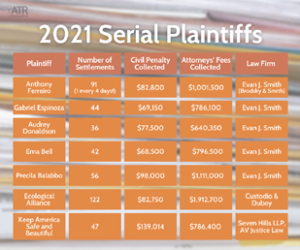
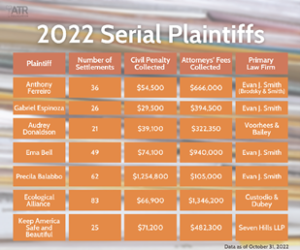
2021 Serial Plaintiffs 2022 Serial Plaintiffs (Data as of October 31, 2022)
The EPA concluded in a 2016 paper that glyphosate was “not likely” to be a human carcinogen, and in June 2020, it issued a preliminary determination that the 2016 paper would be its final determination on the human health effects of glyphosate.
Following the EPA’s determination, plaintiffs challenged the agency in court. In Rural Coalition v. EPA, the plaintiffs claimed that the EPA’s determination was not supported by the “substantial evidence” neces- sary to survive review. The EPA pushed back that the paper was sound science, and “inconsistencies” found and “limitations” experienced while conducting the study “precluded [the agency] from coming to any firm determination on glyphosate’s” cancer risk to humans.
In June 2022, the Ninth Circuit ruled that the EPA “cannot reasonably treat its inability to reach a conclusion about [cancer] risk as consistent with a conclusion that glyphosate is ‘not likely’ to cause cancer” and required the EPA to re-evaluate the cancer risk associated with glyphosate. Following this decision, the EPA stated, “EPA’s underlying scientific findings regarding glyphosate, including its finding that glyphosate is not likely to be carcinogenic to humans, remain the same. In accordance with the court’s decision, the Agency intends to revisit and better explain its evaluation of the carcinogenic potential of glyphosate and to consider whether to do so for other aspects of its human health analysis.”
Because of pending litigation brought by the North American Wheat Growers Association seeking an injunction to block California’s attorney general from requiring a cancer warning on glyphosate products, the California Office of Environmental Health Hazard Assessment amended the regulation to no longer require the phrase, “Glyphosate is known to the state of California to cause cancer.” The amended phrasing guidelines still require manufacturers to warn of the risk of glyphosate but allows them to acknowledge that competing studies exist on whether the chemical is linked to cancer.
Personal Injury Cases
California courts’ willingness to rely on junk science has given rise to thousands of baseless personal injury claims against Roundup®. To date, Monsanto has paid out over $11 billion in judgments and settlements across the country. Currently, there are over 30,000 cases pending, including 4,000 in an MDL in the Northern District of California.
In June 2022, the California Supreme Court refused to review another massive verdict in Monsanto v. Pillioid. The plaintiffs sued Monsanto after they both developed cancer allegedly caused by Roundup®. At trial, the jury awarded them over $2 billion, which was later reduced by a superior court to $87 million. The reduced award was later affirmed by an appellate court. Both the California Supreme Court and the U.S. Supreme Court denied review of Pillioid.
The U.S. Supreme Court had another opportunity to restore sanity to the litigation but unfortunately declined to do so in June of 2022. SCOTUS declined to hear Monsanto v. Hardeman, a $25 million verdict involving glyphosate warnings on Roundup®. The Ninth Circuit rejected Monsanto’s argument that fed- eral law preempts the state law claim because the EPA had approved Roundup’s® label. While many states recognize a defense based on compliance with federal standards, California does not. The court held that the EPA’s continued registration of the product and approval of its label does not carry the force of law, a requirement for federal preemption.
In its amicus brief, ATRA argued that “If left uncorrected, [the Ninth Circuit’s decision] will bring disuniformity to federal preemption doctrine, and it will threaten many businesses with billions of dollars of damages liability for failing to take actions that are illegal under federal law.” The Ninth Circuit’s decision will allow lawsuits to severely punish companies for not including cancer warnings on products, even when near-universal scientific and regulatory consensus is that the product does not cause cancer. The responsible federal agency, the EPA, has forbidden such warnings for Roundup’s® active ingredient, glyphosate. The Ninth Circuit’s decision allows a company to be punished under state law for not including a label that is disallowed by federal regulators.
Despite the early major losses mentioned above, Monsanto won the last five consecutive Roundup® trials in Missouri, California, and Oregon after the credibility of the plaintiffs’ expert witnesses and evidence came into question.
Plastics
Another popular Prop-65 target for plaintiffs’ lawyers are phthalates. Ingestion of phthalates has been linked to cancer in rats, but even OEHHA could not link them to cancer in humans, despite adding them to the Prop-65 list. Congress instituted a permanent ban on phthalates in 2008 for use in children’s toys and specifically cited children putting toys in their mouth as reasoning for the ban, but left phthalate use unregulated otherwise. California has a host of phthalates on the Prop-65 list including DEHP, DIDP, DBP and DINP. DEHP is the main source of phthalate litigation. It is commonly used in items such as plastic pack- aging, shower curtains, PVC pipes, tool grips, apparel and footwear.
PHTHALATE SETTLEMENT DATA:
| Year |
# of Settlements (% of all settlements) |
Total Settlement Payout |
% of Total Settlement to Lawyers |
| 2021 |
371 (55%) |
$7,098,414 |
88% |
| 2022 (As of Oct. 31) |
298 (53%) |
$5,841,400 |
91% |
Acrylamide
California businesses are fighting back against another Prop-65 labeling requirement for products that contain Acrylamide. Acrylamide is a chemical that can form in some foods during high-temperature cooking processes, such as frying, roasting, and baking. The chemical was added to the Prop-65 list in 1990 as a carcinogen and in 2011 as “causing reproductive and developmental effects.”
In March 2021, a California federal court granted a motion for a preliminary injunction barring the Attorney General and anyone else from filing new lawsuits against businesses for not displaying Acrylamide warnings. In California Chamber of Commerce v. Beccerra, U.S. District Judge Kimberly Mueller ruled that the State failed to show that the required cancer warnings are purely factual and uncontroversial. It also failed to show that Prop-65 imposes no undue burden on businesses that would have to provide the warn- ings. The judge said that the acrylamide warning requirement “is controversial because it elevates one side of an unresolved scientific debate” about whether consuming foods and drinks with acrylamide causes cancer.
Following this decision, the Council for Education and Research on Toxins (CERT) appealed the preliminary injunction order and moved for an emergency stay, which the court granted to the extent that it bars any private enforcer from bringing new Prop-65 acrylamide actions.
In an interesting turn of events, Judge Mueller recused herself in September 2021 from the lawsuit at the urging of two advocacy groups that intervened in the case. The documents in the motion remain sealed but seem to argue that Judge Mueller has an interest in the outcome of the case based on her husband’s business interests. While stating that there is nothing requiring her recusal and she has no bias or prejudice, Judge Mueller indicated that she felt pressured by the “uncommonly aggressive, scorched earth efforts” of the advocacy groups, which included extensive personal details about the judge and her husband in their motion that have little relevance to the case. Judge Mueller indicated that she believes the recusal motion was not motivated by a fear of bias, but likely was spurred by the belief that the organizations would have a better chance of success before another judge.
The Ninth Circuit affirmed Judge Mueller’s granting of the preliminary injunction in March of 2022 and denied en banc review of the decision in October; however, that’s not the end of the story. In April 2022, CERT attempted to litigate the issue for a third time in a year and filed a motion to vacate the preliminary injunction order because Judge Mueller did not immediately recuse herself. The case was reassigned to multiple judges and ultimately landed on Judge Ana de Alba’s docket. The case has stalled while Judge de Alba gets up to speed.
New Targets on the Horizon
In early 2022, multiple PFAS were added to California’s Prop-65 list. PFAS are a group of chemicals used in materials such as packaging, textiles and metal piping to make them moisture resistant. Suits involving PFAS make up a very small portion of current litigation, but producers should be on alert.
 After reclaiming its spot atop the Judicial Hellholes® list in 2021, California’s fall to number three can only be attributed to the excessive lawsuit abuse occurring in Georgia and Pennsylvania, as opposed to any improvements made by the Golden State. Courts across the state continue to allow novel theories of liability to proceed and small businesses are bogged down by frivolous lawsuits. Uninjured serial plaintiffs file hundreds of meritless lawsuits targeting businesses, and ultimately, plaintiffs’ lawyers are the only people benefiting from the state’s unbalanced civil justice system.
After reclaiming its spot atop the Judicial Hellholes® list in 2021, California’s fall to number three can only be attributed to the excessive lawsuit abuse occurring in Georgia and Pennsylvania, as opposed to any improvements made by the Golden State. Courts across the state continue to allow novel theories of liability to proceed and small businesses are bogged down by frivolous lawsuits. Uninjured serial plaintiffs file hundreds of meritless lawsuits targeting businesses, and ultimately, plaintiffs’ lawyers are the only people benefiting from the state’s unbalanced civil justice system.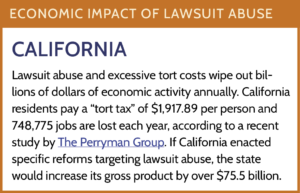
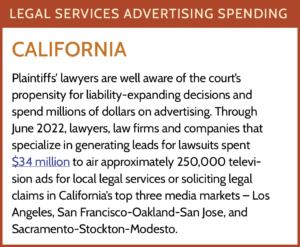



 As is often the case with litigation gold mines in California, serial plaintiffs and their attorneys look to profit from Prop-65 litigation abuse. This activity is primarily driven by several new, aggressive bounty hunter plaintiffs who are searching for payouts despite not suffering any injuries.
As is often the case with litigation gold mines in California, serial plaintiffs and their attorneys look to profit from Prop-65 litigation abuse. This activity is primarily driven by several new, aggressive bounty hunter plaintiffs who are searching for payouts despite not suffering any injuries.


 In January 2022, the Los Angeles County Superior Court gave final approval to a
In January 2022, the Los Angeles County Superior Court gave final approval to a 

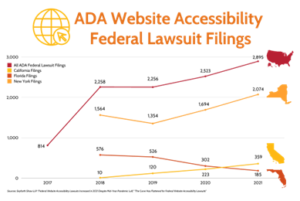
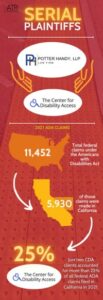 CDA filed
CDA filed 

